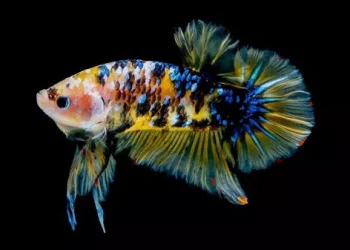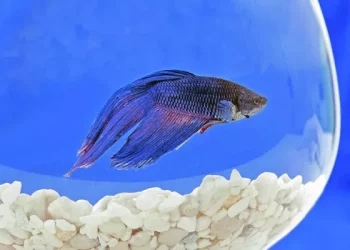Betta fish, with their vibrant colors and flowing fins, are like the royalty of the fish tank. These dazzling little creatures have captivated the hearts of pet lovers around the world. But as a proud betta parent, you might wonder about their feeding habits. Do betta fish need to eat every day? Or can they skip a meal now and then? Let’s dive deep into the world of betta fish and explore their dietary needs, habits, and some fun facts that will leave you chuckling and enlightened.
A Glimpse into Betta Fish Life
Betta fish, scientifically known as Betta splendens, originate from the rice paddies and shallow waters of Southeast Asia. They are often referred to as Siamese fighting fish due to their history of being bred for combat. Luckily, our domesticated bettas have swapped out the fighting ring for the cozy confines of our aquariums. Now, they spend their days gracefully swimming, flaring their fins, and basking in the admiration of their human caretakers.
The Natural Diet of Betta Fish
Before we answer the burning question of whether bettas need to eat every day, let’s first understand their natural diet. In the wild, bettas are carnivorous fish. They feast on a diet of insects, larvae, and small crustaceans. Imagine a tiny betta swimming through a sunlit rice paddy, snatching up bugs like a fishy ninja. Their diet is rich in protein, which is essential for their health and vitality.
In captivity, we must replicate their natural diet as closely as possible. This means providing high-quality betta pellets or flakes that are high in protein. Live or frozen foods, like brine shrimp and bloodworms, are also excellent additions to their menu. So, while bettas enjoy a varied diet, the crux of the matter lies in how often they need to eat.
Do Bettas Need to Eat Every Day?
Now, let’s get to the heart of the matter. The answer is yes, but with a few caveats.
Daily Feeding Routine
Bettas generally thrive on a feeding schedule that includes food every day. Here’s a breakdown of how to approach this:
Frequency: Feed your betta once or twice a day.
Portion Control: Offer a small amount of food that they can consume within two to three minutes. This helps prevent overfeeding, which can lead to health issues.
A daily meal is beneficial for several reasons. Regular feeding promotes good health, helps maintain vibrant colors, and can even enhance their personality. Betta fish are known for their sassy behaviors. They flare their fins when they see their reflection, dance around during feeding time, and sometimes even beg for food by swimming up to the glass and staring at you with those big, expressive eyes.
The Importance of Protein
Protein is crucial for betta fish, as it aids in growth, healing, and overall vitality. A diet lacking in protein can lead to a myriad of health issues, including stunted growth and weakened immune systems. Therefore, choosing a high-protein diet is paramount.
The Debate: Can Bettas Go Without Food?
While bettas generally do need daily meals, they are surprisingly resilient fish. They can go without food for a few days without severe consequences. In fact, it’s not uncommon for bettas to fast for short periods. Here are some situations when a betta might not eat:
Stress: Changes in their environment can make bettas lose their appetite. This includes water quality changes, tank mates, or even new decorations.
Illness: If your betta is feeling under the weather, they might shy away from food. Keep an eye out for other symptoms like lethargy or unusual swimming patterns.
Water Temperature: Bettas prefer warmer water, ideally between 76°F to 82°F (24°C to 28°C). If the temperature dips too low, their metabolism slows down, and they may not eat.
The “Fast” Myth
It’s worth mentioning a common misconception: some fish owners believe that fasting their bettas occasionally is beneficial for their health. While a brief fast isn’t harmful, it’s unnecessary for a healthy betta. In fact, frequent fasting can lead to stress, and we wouldn’t want our beautiful bettas feeling blue!
Signs Your Betta is Hungry
So, how do you know if your betta is ready for a meal? Here are some tell-tale signs that your betta might be hungry:
Pacing: If your betta swims back and forth, especially near the top of the tank, it’s a classic sign they’re ready for dinner.
Flaring: Bettas often flare their fins when they see something they perceive as food. If your betta is flaring at you or their reflection, they might be signaling that it’s feeding time!
Begging: Some bettas have a begging behavior. They may swim up to the glass or even jump a little when they see you approaching with food.
The Dangers of Overfeeding
While it’s tempting to pamper your betta with extra food, overfeeding can be detrimental. Bettas have small stomachs, roughly the size of their eyeballs. Imagine stuffing your stomach full of candy; it would feel pretty uncomfortable, right?
Symptoms of Overfeeding
Signs of overfeeding include:
Bloating: If your betta appears puffed up, they might be eating too much.
Uneaten Food: If you notice leftover food floating around after feeding, it’s a sign you’re giving too much.
Poor Water Quality: Excess food can degrade water quality, leading to health problems for your betta.
Tips for Feeding Your Betta
Feeding your betta doesn’t have to be a daunting task. Here are some tips to keep their meals healthy and enjoyable:
Choose Quality Food: Invest in high-quality betta pellets or flakes. Look for those with high protein content as the first ingredient.
Vary the Diet: Occasionally treat your betta to live or frozen food. They love brine shrimp and bloodworms, which mimic their natural diet.
Avoid Overfeeding: Stick to the two- to three-minute rule. If your betta hasn’t eaten it within that time, remove the excess food.
Feed at the Same Time Daily: Creating a feeding schedule helps establish a routine, making it easier for your betta to know when to expect meals.
The Role of Environment in Feeding
The environment plays a significant role in your betta’s appetite. A clean, well-maintained tank with appropriate water parameters will encourage your betta to eat.
Water Quality
Bettas thrive in clean water. Regular water changes are essential. If the water is murky or has high ammonia levels, your betta may feel stressed and refuse to eat. Testing the water regularly and using a good filtration system can help maintain a healthy environment.
See Also: How Long Can Betta Fish Survive in Cold Water?
Tank Mates
If your betta shares their tank with other fish, ensure they are compatible. Bettas can be territorial, and stress from aggressive tank mates may lead to a loss of appetite. If your betta is constantly flaring at their tank mates, it might be time for a tank reassessment.
Betta Behavior: Feeding Time Fun
Feeding time can be one of the most entertaining moments in your betta’s day. Bettas have unique personalities, and their behaviors can be quite amusing.
Feeding Frenzy
When it’s time to eat, many bettas will go into a feeding frenzy. You might see them darting around the tank, showcasing their vibrant colors and fancy fins. Some bettas even perform acrobatics, leaping out of the water in excitement. Just be careful not to let them jump out of the tank!
The “Mugging” Factor
Some bettas develop a habit of “mugging” for food. This means they will swim up to the glass and stare at you with wide eyes, waiting for their meal. It’s their way of saying, “Hey, human! I’m hungry!” This behavior can be quite endearing, making you feel like you’re in a cute fishy sitcom.
The Final Word: Feed with Love
As a proud betta parent, you want the best for your little friend. Understanding their feeding needs is essential for their overall health and happiness. While bettas generally benefit from daily meals, it’s vital to monitor their appetite, water quality, and environment.
Feeding should be a fun and bonding experience for you and your betta. Make it a routine, and soon enough, you’ll have a healthy, happy fish who knows that mealtime is a special event. Just remember to keep an eye on portion sizes and watch for any signs of distress or overfeeding.
Fun Betta Facts to Brighten Your Day
Colorful Personalities: Bettas come in various colors and patterns. From vibrant blues to fiery reds, each betta has a personality as unique as their coloration.
Breather Fish: Betta fish have a special organ called a labyrinth organ that allows them to breathe air from the surface. This is why you’ll often see them swimming to the top for a breath of fresh air!
Bubble Nests: Male bettas build bubble nests as part of their mating behavior. These nests are a sign of a happy and healthy betta!
Sassy Attitude: Bettas are known for their bold and sassy personalities. They may flare their fins or chase after their own reflections in the glass.
Conclusion
In the delightful world of betta fish, daily feeding is key to keeping your little aquatic friend happy and healthy. A balanced diet of high-quality food and the occasional treat will ensure your betta thrives. With proper care, regular meals, and plenty of love, your betta will not only survive but flourish, bringing joy and color to your home for years to come. So go ahead, feed your betta, and enjoy the show!
Related Topics:


























